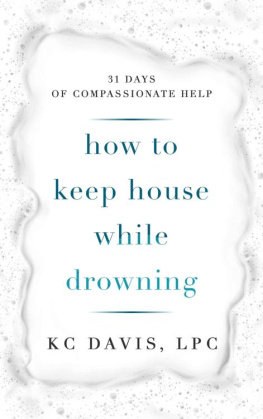KC Davis - How to Keep House While Drowning: 31 days of compassionate help
Here you can read online KC Davis - How to Keep House While Drowning: 31 days of compassionate help full text of the book (entire story) in english for free. Download pdf and epub, get meaning, cover and reviews about this ebook. year: 2020, genre: Home and family. Description of the work, (preface) as well as reviews are available. Best literature library LitArk.com created for fans of good reading and offers a wide selection of genres:
Romance novel
Science fiction
Adventure
Detective
Science
History
Home and family
Prose
Art
Politics
Computer
Non-fiction
Religion
Business
Children
Humor
Choose a favorite category and find really read worthwhile books. Enjoy immersion in the world of imagination, feel the emotions of the characters or learn something new for yourself, make an fascinating discovery.
- Book:How to Keep House While Drowning: 31 days of compassionate help
- Author:
- Genre:
- Year:2020
- Rating:5 / 5
- Favourites:Add to favourites
- Your mark:
- 100
- 1
- 2
- 3
- 4
- 5
How to Keep House While Drowning: 31 days of compassionate help: summary, description and annotation
We offer to read an annotation, description, summary or preface (depends on what the author of the book "How to Keep House While Drowning: 31 days of compassionate help" wrote himself). If you haven't found the necessary information about the book — write in the comments, we will try to find it.
KC Davis: author's other books
Who wrote How to Keep House While Drowning: 31 days of compassionate help? Find out the surname, the name of the author of the book and a list of all author's works by series.
How to Keep House While Drowning: 31 days of compassionate help — read online for free the complete book (whole text) full work
Below is the text of the book, divided by pages. System saving the place of the last page read, allows you to conveniently read the book "How to Keep House While Drowning: 31 days of compassionate help" online for free, without having to search again every time where you left off. Put a bookmark, and you can go to the page where you finished reading at any time.
Font size:
Interval:
Bookmark:
How to Keep House While Drowning
31 days of compassionate help
KC Davis, LPC
Copyright 2020 KC Davis.
INTRODUCTION:
What are care tasks and why are they so hard for people?
Care tasks are the chores of life: cooking, cleaning, laundry, feeding, dishes, and hygiene. These may seem like simple or noncomplex tasks to most. But when you actually break down the amount of time, energy, skill, planning, and maintenance that go into care tasks, we begin to see that they are not always simple. For example, the care task of feeding yourself is not simply the act of putting food into your mouth. It is also making time to purchase that food, deciding what food to purchase, knowing what nutritional needs should be guiding your decisions, being knowledgeable on what foods meet those needs, planning how to prepare that food and setting aside the time to do so, ensuring that feeding comes at correct intervals, and taking into consideration health needs and preferences of all people you are feeding. It also requires the energy and skills necessary to plan, execute, and follow through on these steps every day, multiple times a day. It requires the coping skills to deal with any barriers related to ones relationship with food and weight, a lack of appetite due to medical or emotional factors, and the frustration tolerance to deal with any messes you may create in the process. You must have the emotional energy to deal with the feeling of being overwhelmed when you dont know what to cook and the anxiety it can produce to create a kitchen mess. You may also need the skills to multitask while working, dealing with physical pain, or watching over children.
We can do this same exercise with cleaning. Cleaning is an ongoing task made up of hundreds of small skills that must be practiced every day at the right time and manner in order to keep going on the business of life. First, you must have the executive functioning to deal with sequentially ordering and prioritizing tasks. You must learn which cleaning must be done daily and which can be done on an interval. You must remember those intervals. You must be familiar with cleaning products and remember to purchase them. You must have the physical energy and time to complete these tasks and the mental health to engage in a low-dopamine errand for an extended period of time. You must possess the faculties to process any sensory discomfort that comes with dealing with any dirty or soiled materials. Just clean as you go sounds good and nice, but most people do not appreciate the hundreds of skills it takes to operate that way and the thousands of barriers that can interfere with learning or executing those skills properly.
Health and hygiene are far more complex than eat healthy and shower. You must possess the social skills to call the doctor and attend appointments. You must have the time and energy to fill prescriptions and again, the executive functioning to take them every day. Even tasks that appear to be secondhand thoughts to most peoplebrushing your teeth, washing your hair, changing your clothescan become almost impossible in the face of major mental illness, physical disability, or executive dysfunction.
Even when one possesses optimal mental and physical health, care tasks can become insurmountable in the face of some pretty simple life changes. Having a baby, losing a spouse, coming down with a debilitating illness, or having to pick up a second (or third) job can quickly make care tasks switch from something done on auto pilot to something that can only be done with purposeful thought and energy expenditure. But someone in these circumstances may now have none to spare.
When barriers to functioning make completing care tasks difficult, a person can experience an immense amount of shame. How can I be failing at something so simple? they think to themselves. They are unlikely to reach out for help with these tasks due to intense fear of judgment and rejection. As shame and isolation increase, mental health plummets. Self-loathing sets in and motivation vanishes. The critical internal dialogue quickly forms a vicious cycle, paralyzing the person even further.
If you are crying right now, this book is for you.
A Note on Professional Care
This book is about learning how to tackle care tasks when you have functional barriers. It isnt meant to be a replacement for therapy or medical care. Therapy, medications, or other professional interventions are necessary for many people to reach their functioning potential. If you do not currently have a mental health or medical provider, you should find one. There are low-cost options listed in the appendix. Remember that you do not have to qualify for a diagnosis to deserve relief from your distress. Please seek a professional provider to guide you and meet your unique needs. This book will be here to help you between sessions.
Download my PDF on how to find a good therapist for free on my website: www.strugglecare.com
The Pillars of Struggle Care

The six pillars of Struggle Care are the foundational concepts this book is built on. When you fail at care tasks you may feel an intense amount of shame. You may tell yourself if I could just get better at this I wouldnt hate myself so much. But youve got it the wrong way around. You deserve love and compassion regardless of your level of functioning. True skill building can only happen in an atmosphere of profound self-compassion and gentleness. On a foundation of compassion and rest, with the view of care tasks as morally neutral, rejecting shame and perfectionism, you can begin to explore ways of caring for your body and space that best serve you.
Once that foundation is laid, we can begin to look into ways to maneuver around our functional barriers. There are so many great tips for helping the ADHD mind complete tasks, tons of tricks for hacking motivation when you feel depressed, and a breadth of tools available to help you learn the skills you were never taught in your childhood. That is why gentle skill building is the last pillar of struggle care. If you try to jump right to how do I do this better without unpacking the emotional messages you give yourself around care tasks, you are likely to end up continuously trapped in the cycle of anxiety and exhaustion.
Care Tasks are Morally Neutral
When you view care tasks as moral, not being good at them means you are failing, youre unsuccessful, youre not a valid adult, and you are a bad partner or parent. Who would love someone like that? With this mindset, you may feel like a fake even among your friends or at work. It is impossible for the kindness or affirmation of others to penetrate your heart when you are thinking, if you only knew
When you view care tasks as moral, the motivation for completing them is often shame. When everything is in place, you dont feel like a failure; when its messy or untidy, you do.
If you are completing care tasks from a motivation of shame, you are probably also relaxing in shame toobecause care tasks never end and you view rest as a reward for good boys and girls. So if you ever actually let yourself sit down and rest, youre feeling shame and thinking, I dont deserve to do this. There is more to do.
This is an incredibly painful way to live. It affects your entire life: your mental health, your relationships, your friendships, your work or schooling, your physical health. But it doesnt have to be this way. In fact, I have very good news for you.
Care tasks are morally neutral. Being good or bad at them has nothing to do with being a good person, parent, man, woman, spouse, friend. Literally nothing. You are not a failure because you cant keep up with laundry. Laundry is morally neutral.
Next pageFont size:
Interval:
Bookmark:
Similar books «How to Keep House While Drowning: 31 days of compassionate help»
Look at similar books to How to Keep House While Drowning: 31 days of compassionate help. We have selected literature similar in name and meaning in the hope of providing readers with more options to find new, interesting, not yet read works.
Discussion, reviews of the book How to Keep House While Drowning: 31 days of compassionate help and just readers' own opinions. Leave your comments, write what you think about the work, its meaning or the main characters. Specify what exactly you liked and what you didn't like, and why you think so.











